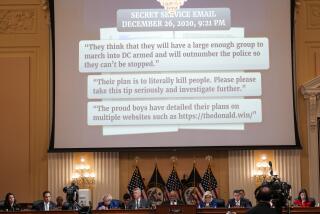Washington in High Gear for the Coup : Soviet Union: Moscow-watchers could do little but observe during the last hectic weeks. Now a reappraisal is beginning.
- Share via
WASHINGTON — The federal government’s top Soviet-watchers have been burning the midnight oil regularly during the past two weeks’ crisis in the Soviet Union, but by their own admission they have had little to do but watch. Now, they’re about to reappraise what they have seen.
As communism collapsed and the very fabric of the Soviet Union disintegrated, Soviet specialists in the State Department were dispatched to staff around-the-clock reaction centers. Events broke at a rapid pace.
According to several officials, however, the developments in Moscow were essentially beyond the influence of the U.S. government, so there was little to do but try to evaluate what was happening so that decision-makers here could keep informed.
But the long Labor Day weekend marks the end of a hectic period of crisis-evaluation and the start of a long re-examination of the fundamental relationship between Washington and Moscow.
Although the future of the Soviet Union is far from settled, most U.S. Moscow-watchers have returned to normal schedules, waiting for the fraying Soviet center and the independence-minded Soviet republics to sort things out among themselves.
Shortly after the coup by hard-line Communists appeared, temporarily, at least, to depose President Mikhail S. Gorbachev, the Pentagon dusted off its contingency plan for coping with a resumption of the Cold War. But, as the putsch collapsed, the plan went back into the file.
“The military gets paid to plan for all sorts of contingencies,” one Pentagon official said. “We had to do a lot of watching. We had to see how things developed because it was a very fluid situation. Major events were happening hourly.”
The anti-Gorbachev coup and its aftermath caught much of the U.S. government on vacation. Secretary of State James A. Baker III, Defense Secretary Dick Cheney, Treasury Secretary Nicholas F. Brady and others broke off vacations and hurried back to the capital.
So did a handful of people who either judged themselves to be indispensable or just did not want to miss the action. But most officials were not summoned back. Instead, the government functioned with the people who were here.
Within hours of the announcement in Moscow that Gorbachev was “ill” and had been replaced in power, the State Department created a 24-hour-a-day task force. The group--with about 20 Soviet watchers at its peak--functioned for four days, until after Gorbachev’s return.
Among other things, the task force responded to more than 8,500 telephone calls to special “hot-line” numbers for those seeking information about American citizens who were in the Soviet Union at the time of the coup or about conditions for possible travel to that country.
Officials say the task force was made up of “working-level people” who kept in constant contact with Deputy Secretary of State Lawrence S. Eagleburger, who served as acting secretary of state throughout the crisis.
Under normal State Department procedure, there is always an acting secretary of state in Washington. If the secretary is out of town for any reason, the highest-ranking State Department official in Washington takes over.
Although Baker broke off a vacation at his lakeside retreat in Wyoming to confer with President Bush and to attend a NATO meeting in Brussels, he spent very little time in Washington during the crisis.
One official said Baker conferred frequently by telephone with his staff in the capital but, like Bush, he did not cancel his vacation plans.
Other members of Baker’s inner circle also did most of their work by telephone. Policy planning chief Dennis Ross, Undersecretary Robert Zoellick and spokeswoman Margaret Tutwiler all remained out of the capital, although aides said they called the office frequently.
Zoellick briefly interrupted a vacation in Britain to attend a London crisis meeting of officials of the Group of Seven major industrialized democracies to consider Moscow’s requests for economic aid.
Beyond the State Department and the Pentagon, other agencies also scrambled to respond to the crisis.
For instance, the Voice of America increased its schedule of broadcasts to the Soviet Union, and the U.S. Information Agency commissioned several rush public opinion polls in Eastern Europe concerning reaction to the events in Moscow.
At the Agriculture Department, not usually considered the epicenter of international crisis, officials accelerated previously scheduled grain shipments to the Soviet Union and made preparations to send emergency humanitarian food aid.
“Everyone held his breath while the coup was playing out,” said Paul Dickerson, general sales manager of the Agriculture Department’s foreign agricultural sales service. “At this point the attention is intense because of reports that the harvest in the Soviet Union will be lower than last year. We anticipate requirements to be up sharply.”
More to Read
Sign up for Essential California
The most important California stories and recommendations in your inbox every morning.
You may occasionally receive promotional content from the Los Angeles Times.













